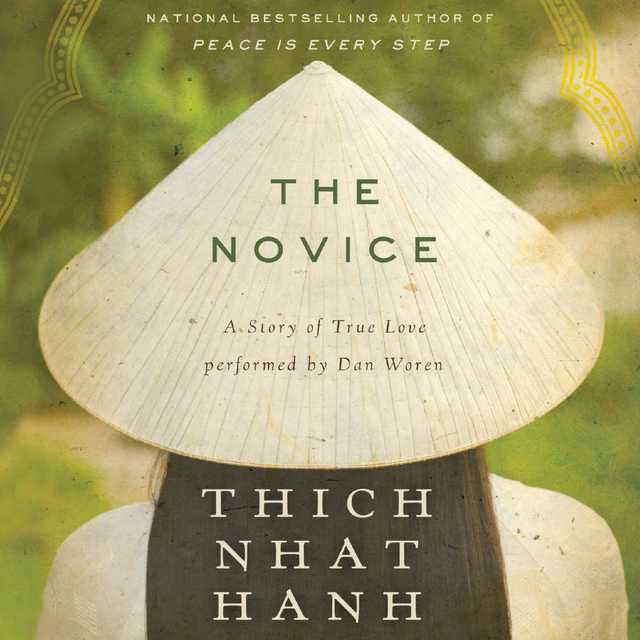The Novice Audiobook Summary
Fans of Thich Nhat Hanh’s Peace is Every Step and Anger, and Deepak Chopra’s Buddha, will appreciate Hanh’s wisdom and storytelling in his novel The Novice, which contains universal themes that transcend all boundaries of faith, creed, country, and era.
Through the parable of a young woman who stays true to herself and her faith in the face of adversity, Vietnamese Zen Buddhist master and peace activist Thich Nhat Hanh enables readers to embark on their own path of introspection and self-discovery.
With his trademark insight, Hanh presents a path to greater awareness of the means to manifest peace both inside oneself and in the world at large.
Other Top Audiobooks
The Novice Audiobook Narrator
Dan Woren is the narrator of The Novice audiobook that was written by Thich Nhat Hanh
Thich Nhat Hanh was a world-renowned Buddhist Zen master, poet, author, scholar, and activist for social change, who was nominated for the Nobel Peace Prize by Dr. Martin Luther King Jr. He was the author of many bestselling books, including the classics Peace Is Every Step and The Art of Living. Through his books and retreats at the monasteries he has founded in the U.S., Europe, Asia, and Australia, he became a pre-eminent figure in contemporary Buddhism, offering teachings that are both deeply rooted in ancient wisdom and accessible to all.
Sister Chan Khong is Thich Nhat Hanh’s most senior monastic disciple and lifelong collaborator. A leading force in his engaged Buddhism programs and humanitarian projects, her books include Learning True Love and Beginning Anew.
Sister True Dedication is a former journalist and monastic Dharma Teacher ordained by Thich Nhat Hanh.
About the Author(s) of The Novice
Thich Nhat Hanh is the author of The Novice
More From the Same
- Publisher : HarperAudio
- Abraham
- American Gods [TV Tie-In]
- Dead Ringer
- House of Sand and Fog
- Prey
The Novice Full Details
| Narrator | Dan Woren |
| Length | 2 hours 38 minutes |
| Author | Thich Nhat Hanh |
| Category | |
| Publisher | HarperAudio |
| Release date | August 23, 2011 |
| ISBN | 9780062099631 |
Additional info
The publisher of the The Novice is HarperAudio. The imprint is HarperAudio. It is supplied by HarperAudio. The ISBN-13 is 9780062099631.
Global Availability
This book is only available in the United States.
Goodreads Reviews
Vicki
January 06, 2013
It is amazing how a book sometimes finds it way to you when you need it most. I've read other books by Thich Nhat Hanh so I knew this would be a great story but I didn't expect it to have such an impact on me, I read it in one sitting. I needed to be reminded of how important it is to forgive. The story line is simple and yet so thought provoking. A young woman who wishes to be a buddhist monk disguises herself as a young man and becomes a novice. Another young woman in the village accuses the "monk" of raping her and inpregnating her. Further complicating matters, the monk then begins raising the baby allegedly conceived by the rape. If the monk reveals her secret, she will no longer be able to be a monk and achieve the buddha nature she so longs for. If she says nothing, then she tacitly endorses injustice and the false accusation. I won't tell the whole story here. :)In addition to being a wonderfully simple story that is well written, this reminds each of us to reflect on the daily injustices, judgements and wrongs that occur in our daily lives. It helps us to understand how we can respond to such issues tactfully, with grace, and in such a way that order is restored. This book is a lovely way to introduce yourself or someone else to the Buddhist concepts of loving-kindness and compassion.
Crystal
October 15, 2015
I stumbled upon this book because I'm planning a short story collection based on Vietnamese folk stories and renovated operas centered around women, and wanted to see if anyone had written a story about Quan Am Thi Kinh in English yet. I was pleasantly surprised to find that one had been written by Buddhist monk Thich Nhat Hanh, whose name is famous within the Buddhist community. I ordered it immediately. The volume is thin, but packs a punch. Anyone looking for a bit of spiritual wisdom will benefit greatly from reading this. Having grown up around the Thi Kinh legend, I didn't think this would be anything new. On some levels it's not--the story is well known and this version doesn't mess TOO much with the original material. However, Thich Nhat Hanh pays attention to all the minor characters that one doesn't really hear much about in most retellings, and does so in a compassionate way that highlights their humanity. In reading this, one should keep in mind that the author is not a novelist and that the book's purpose is to convey Buddhist teachings to the reader. There's a lot of explanation about the teachings of Buddha, the writing style is pretty basic, and it can be a tedious read for someone who reads a lot of good fiction. You likely won't find anything very commendable about the prose itself; it's the lessons one learns from the book that are important. I definitely struggled to read through it because it was so preachy, but I was glad I did read it. Overall, a good book to read if you're curious about Buddhism but can't stomach nonfiction. I am not very religious, but I felt significantly more reverent after reading this book.
Jeanne
March 20, 2021
Kinh Tam was a young girl who wanted to become a monk and study Buddhism. That path was blocked to her because of her gender. Her parents married her to a young man who was devoted to her, but had little motivation. When she attempted to cut wayward hairs from his beard, his parents accused her of attempted murder and forced her to leave the marriage. Her husband did not defend her.Kinh Tam journeyed from her family home, dressed as a man, and eventually joined an abbey as a novice. She was exceptionally devoted to her work and grew in wisdom and compassion. A daughter from a wealthy family fell in love with Kinh Tam – who refused her. Thi Mao, hurt and angry, slept with one of her servants and became pregnant. Thi Mao named Kinh Tam as the father. Kinh Tam was nearly killed by the town in their attempts to get her to admit she was the father – but she refused to tell a lie. Thi Mao gave birth and delivered Thien Tam to Kinh Tam's care. This would identify Kinh Tam as the Thien Tam's father, yet she accepted him and agreed to serve as his "father-teacher." She was still living as a man.All of this is no surprise and no spoiler. The reason one reads Thich Nhat Hanh is not about the story, but to learn how we can choose to respond to adversity, the adversity that all of us experience. Kinh Tam chose to keep Thien Tam. When challenged, Kinh Tam argued, "Dear teacher, you have taught me that the merit to be gained through building an elaborate temple nine stories high cannot compare to that of saving the life of one person" (p. 6). One of the other novices asked her, “Why not save any other person, instead of saving that particular person?” (pp. 69-70). Nonetheless, Kinh Tam's sense of integrity and her compassion for all beings would not allow her to bypass the obstacles she faced in her life, the obstacles that the other people in this story faced and that destroyed her.* * *Quan Am Thi Kinh was a bodhisattva renowned for compassion extended to everyone, infinite forgiveness, and endless and patient forbearance. She is known by different names in different countries, although I know her as Kwan Yin. She is an inspiration for engaged Buddhism. She did not see meditation as an end in itself, but as something extended out into the real world. As Sister Chan Khong said, "I feel that we are very fortunate [despite frequent governmental attacks]. We are going through all these hardships, but our hearts’ compassion remains intact; we harbor no anger, not a single wish of retaliation or harm to anyone” (p. 125).Kwan Yin's life – Thich Nhat Hanh's version – reminds us to practice in order to transcend adversity while behaving with compassion toward others.
Monty
June 27, 2013
If Buddhism or Guan Yin are not of interest to you, then a two or three star rating would be in order. The story of Kinh Tam and how she became known as Quan Am Thi Kinh (Guan Yin) is elaborated on by Thich Nhat Hanh in an uncomplicated, easy manner, as if he were talking to young people. This teaching style is deceptively simple because it covers several Buddhist principals. I was surprised at the end of the story when I had tears in my eyes. I'm not sure where the tears came from though I suspect that at least, in part, they were stimulated by my attempts to grasp the true meaning or what it is like to accept all people, whether they let you down, falsely accuse you, belittle you, ignore you, treat you like a non-person, and more. Kinh Tam, who experienced those judgments from others was able to maintain equanimity towards all beings by practicing Buddhist principles of compassion and non-judgment. The 100 page story was followed by an essay by Sister Chan Khong, an expatriate Vietnamese Buddhist nun and peach activist who has worked closely with Thich Nhat Hanh for over 50 years. Part of the essay includes examples of how Vietnamese Buddhist monastics and social workers were discriminated against and even murdered by those in power in both the 1960s and the 2000s. There is a brief essay at the end of the book by Thich Nhat Hahn where he explains how, no matter what is happening to us from the outside, we can always find refuge in the true home within ourselves.This book is obviously not for everyone, though I would recommend it to those whose curiosity has been aroused. Here is a link that discusses Guan Yin. http://en.wikipedia.org/wiki/Guanyin
Eric T. Voigt
October 25, 2021
The non-fiction sections at the end were more inspiring than the text of the novel.
Kali
June 08, 2020
A Young woman (Kinh Tam) who wishes to be a Buddhist monk disguises herself as a young man and becomes a novice. Another young woman (Thi Mau) in the village accuses the "monk" of having a sexual affair that made her pregnant. If the monk reveals her secret, she will no longer be able to be a monk and achieve the Buddha nature she so longs for. If she says nothing, then she tacitly endorses injustice and the false accusation. As intriguing as it may sound, the rest of the story doesn't really resonate with the story-conflict. Infact, it is more of a series of events that follow the secret life of Kinh Tam. On top of that, the Buddhist literature, the mantras & chants (My personal favourite The Great Bell Chant which you will find in Youtube) TNH tried to forcefully infuse into the story feels on the nose and out of place at times. But having said so, there is something profound about the book that struck a chord in me, especially the bonus insight towards the end. Its relevance was only clear to me after reading it; the suppression of Buddhist religious leaders and followers by Police force & local Communists back in 1960s and how Thay and his student monks endured and fought back with loving-kindness and inclusiveness that resonated loudly in the book.This is a small book, with a powerful message which is may well very-relevant to our times. Despite the shortcomings in its writing I still feel it's a beautiful read. 4/5This World doesn't need more successful people. The World desperately needs more peacemakers, healers, restorers, storytellers and lovers of all kinds.~Dalai Lama
Fadillah
February 05, 2022
"Surely anyone who has lived on Earth has had to experience injustice of one kind or another. If we allow hatred and revenge to dictate our response, then our suffering will only go on and on. How do we find a way out? How can we free ourselves? A person who feels injured by another typically harbors thoughts of revenge, wanting to punish the offender. But the Buddha taught that hatred is never removed by adding more hatred. The only stream that can wash away the pain of unjust acts is the sweet water of loving-kindness and compassion. Without loving-kindness and compassion, hatred and vengeance will continue to accumulate from one year, and one lifetime, to the next."- The novice : A story of true love by Thich Nhat Hanh..The Novice” is based of Vietnamese folklore of a young monk who is repeatedly wronged, but who always does the right thing - not once held a grudge and accept it as part of of life. This young monk is Quan Am Thi Kinh or known as Kinh Tam. She is a beautiful young woman. Like other women back then, marriage seems the only way to progress to next stage of life so she ends up being married to a useless husband. Then, she was falsely accused by her husband and in-laws that she attempted to kill him while trying to shave his beard. She did not admit her guilt and as a repercussion, she was sent back to her own family in shame. Kinh Tam decided to leave town and disguised as a man. The reason of her disguise is due to her wishes to live the life of a monk. At the time, she knew that there are no roles for women in Buddhism unless she find a way to pursue her dream of studying Buddhist. She managed to gain entry to a monastery as a novice. She is devoted to the dharma. Years of service and joy in her calling, many people are inspired by her wisdom, devotion and humility. She becomes famous among the locals which unfortunately leads to another false accusation. Kinh Tam is accused by a local woman of causing her to be pregnant. She did not reveal her own gender and ended up up raising the child as her own at the monastery. She endured all the given punishment and slander by the community. In the end, she died peacefully and still forgiving everyone around her, including those that have victimized her is a true testament of her faith and devotion to Buddhist. An account by Sister Chan Khong at the end of the book did draw a connection between the novelist (Thich Nhat Hanh) and his protagonist (Kinh Tam). Sister Chan Khong did provide important events that happened when they tried to establish a monastery in Communist Vietnam and it did show that Thich Nhat Hanh has also endured great hardship, banishment and pain during that time. Overall, the story is fairly short. However, it did not take away anything important as someone who wanted to read and know more about the principles of non-violence, concepts of loving-kindness and compassion in Buddhism, i felt it did well in introducing me to it.
DeeDee
October 31, 2020
A very interesting parable that teaches how to deal with suffering and forgiveness. The story did talk to me personally by when dealing with despair and terrible conditions, do not keep going in that same direction but go home to yourself. The quote, "taking refuge in the island of self" that you need to find peace and comfort within yourself by changing directions so "you don't continue to lose yourself in the storms of outside circumstance" which can destroy you and the people around you.
Dieu
February 09, 2021
This is classic Vietnamese folk story told through a Buddhist lens. The story gets lost at times because the storytelling focuses much more on Buddhism than the plot (but what can we expect, as this is written by a Buddhist monk). More like 3.5 stars. (I actually enjoyed the afterword more than the novel at times. This section is written by a Buddhist nun and explains the treatment of Buddhist monks in Vietnam during the war as well as in 2009.)
Pamela
June 21, 2018
"Cuando nuestro corazón está lleno de bondad, compasión, alegría y ecuanimidad, su capacidad se torna ilimitada, inconmensurable. Con un corazón tan amplio, inmenso como el vasto mar, el sufrimiento y las flagrantes injusticias no pueden vencernos, así como un pequeño puñado de sal no vuelve salado un gran río."
Lili
December 25, 2022
Una novela que merece ser leída. Una narración que nos muestra como la generosidad, bondad y tolerancia son algunos elementos que nos llevan al encuentro con nuestro ser interior.
Bernie
February 03, 2014
The Novice is the retelling of a Vietnamese folk tale about a young monk who is repeatedly wronged, but who always does the virtuous thing. As I read this book, I thought the story seemed familiar, and I realized that I read the same story as The Martyr by Ryūnosuke Akutagawa. Akutagawa does a much better job of story building. The Japanese writer doesn’t reveal to the reader that Lorenzo (his novice and the equivalent of Thich Nhat Hanh’s Kihn Tâm) is a female until the end—thus definitely resolving the claim that the young monk fathered a child out of wedlock and in contravention of vows f0r the reader at the same time as the characters in the story learn it. Thich Nhat Hanh tells us that the novice is a female at the beginning, and he does so via backstory that serves both to give justification for why Kihn Tâm chooses to disguise herself and become a monk and to pile onto the injustice. We learn that Kihn Tâm’s female alter ego had been married, but the marriage ended with a false accusation of attempted murder of her husband. This backstory probably isn’t worth the drag for either of the aforementioned purposes—but the former is more justifiable than the latter. What Thich Nhat Hanh lacks in gripping narrative structure, he gains in provoking thought. The Zen monk and poet gives the reader insight into how Kinh Tâm manages to be preternaturally virtuous. In The Martyr this is a black box affair. Hanh also encourages the reader to see Kihn Tâm’s accusers as the novice does, i.e. with compassion. Akutagawa does what any writer would do; he vilifies the accusers so as to make the story resonate with the average, petty, martyr-complex prone reader—as opposed to the enlightenment-aspiring reader. Hanh leaves the other monks in Kinh Tâm’s corner, i.e. when everyone else is condemning the novice, they still believe in her. Akutagawa does not present monastics in such a perfect light. The book offers some interesting back matter. The most substantial of the appendices is an account by Sister Chan Khong of the works of Thich Nhat Hanh and his followers both during the war and afterword when they tried to establish a monastery in Communist Vietnam. The essay echoes the themes of loving-kindness and compassion that form the core of the novella, as does the essay by Hanh that brings the book to a conclusion. While this back matter is filler to make up for the fact that the story is not novel length, it nevertheless makes for interesting reading. I’d recommend this book for those with an interested in Zen. If you’re looking for a good story, read Akutagawa’s The Martyr, but if you want to be inspired to compassion, read Thich Nhat Hanh.
Daniel
March 18, 2013
The book would be a boring insight into Buddhist Monastic life,if it was about a man.In the area of Vietnam where the Buddhist Monastery is they did not have nuns who practiced in the area,although in this time period they existed.To compare and contrast,if a person leaves his or her gender role,they commit a grave and mortal sin in the Catholic Church.Taking a false vow or a deception can be equally frowned on in Buddhism.Doing thing in a prayerful and relatively slow and mindful way is a lot like Saint Theresa of Lisieux,also known as the "Little Flower",meant when she said"Do little thing with great love",a Doctor of the Catholic Church,like she had gotten a Doctorate in Theology,while she was alive. Kinh Tam would do many hard duties,but ringing the Buddhist Monastery was one duty,that everyone enjoyed her doing.The book is a lot like a parable Jesus would of told and this book also includes a mini autobiography about Thich Nhat Hanh,the book is worth reading...
James
August 10, 2012
This is indubitably an amazing tale. The only reason I didn't give it five stars is this: though the tale stands perfectly well, it's set in a time before DNA testing, etc., and the ridiculously close-mindedness of judgmental folks in a caste system. I realise that modernity is definitely not the point of the book, but it did steal a little from the enjoyment of reading it. That said, the story translates to any situation in the modern world, meaning how people deal with difficult circumstances. Buddhist monks work hard to achieve Enlightenment, which few of us will ever do, but I find it strange that so few of us adopt their loving nature--our true nature.I recommend this book highly. You'll be thinking about it long after, at least if you read it mindfully you will.
HarperOne (an imprint of HarperCollins)
June 13, 2013
In the tradition of Deepak Chopra’s Buddha, Thich Nhat Hanh offers a poignant and beautiful novel with the power to teach, transform, and transcend all boundaries of faith, creed, country, and era. For readers who know Hanh from books such as Peace is Every Step and Anger, or for those who may be new to the writing of the Vietnamese Zen Buddhist master and peace activist, The Novice will open a soulful road of introspection and self-discovery, a path leading to greater awareness of the means to manifest peace both inside oneself and in the world at large.
Susanne
June 08, 2020
Mooi verhaal, leest makkelijk, over de vier onmetelijken (liefdevolle vriendelijkheid, mededogen, vreugde en gelijkmoedigheid) en stukje geschiedenis van Vietnam.
Frequently asked questions
Listening to audiobooks not only easy, it is also very convenient. You can listen to audiobooks on almost every device. From your laptop to your smart phone or even a smart speaker like Apple HomePod or even Alexa. Here’s how you can get started listening to audiobooks.
- 1. Download your favorite audiobook app such as Speechify.
- 2. Sign up for an account.
- 3. Browse the library for the best audiobooks and select the first one for free
- 4. Download the audiobook file to your device
- 5. Open the Speechify audiobook app and select the audiobook you want to listen to.
- 6. Adjust the playback speed and other settings to your preference.
- 7. Press play and enjoy!
While you can listen to the bestsellers on almost any device, and preferences may vary, generally smart phones are offer the most convenience factor. You could be working out, grocery shopping, or even watching your dog in the dog park on a Saturday morning.
However, most audiobook apps work across multiple devices so you can pick up that riveting new Stephen King book you started at the dog park, back on your laptop when you get back home.
Speechify is one of the best apps for audiobooks. The pricing structure is the most competitive in the market and the app is easy to use. It features the best sellers and award winning authors. Listen to your favorite books or discover new ones and listen to real voice actors read to you. Getting started is easy, the first book is free.
Research showcasing the brain health benefits of reading on a regular basis is wide-ranging and undeniable. However, research comparing the benefits of reading vs listening is much more sparse. According to professor of psychology and author Dr. Kristen Willeumier, though, there is good reason to believe that the reading experience provided by audiobooks offers many of the same brain benefits as reading a physical book.
Audiobooks are recordings of books that are read aloud by a professional voice actor. The recordings are typically available for purchase and download in digital formats such as MP3, WMA, or AAC. They can also be streamed from online services like Speechify, Audible, AppleBooks, or Spotify.
You simply download the app onto your smart phone, create your account, and in Speechify, you can choose your first book, from our vast library of best-sellers and classics, to read for free.
Audiobooks, like real books can add up over time. Here’s where you can listen to audiobooks for free. Speechify let’s you read your first best seller for free. Apart from that, we have a vast selection of free audiobooks that you can enjoy. Get the same rich experience no matter if the book was free or not.
It depends. Yes, there are free audiobooks and paid audiobooks. Speechify offers a blend of both!
It varies. The easiest way depends on a few things. The app and service you use, which device, and platform. Speechify is the easiest way to listen to audiobooks. Downloading the app is quick. It is not a large app and does not eat up space on your iPhone or Android device.
Listening to audiobooks on your smart phone, with Speechify, is the easiest way to listen to audiobooks.






























